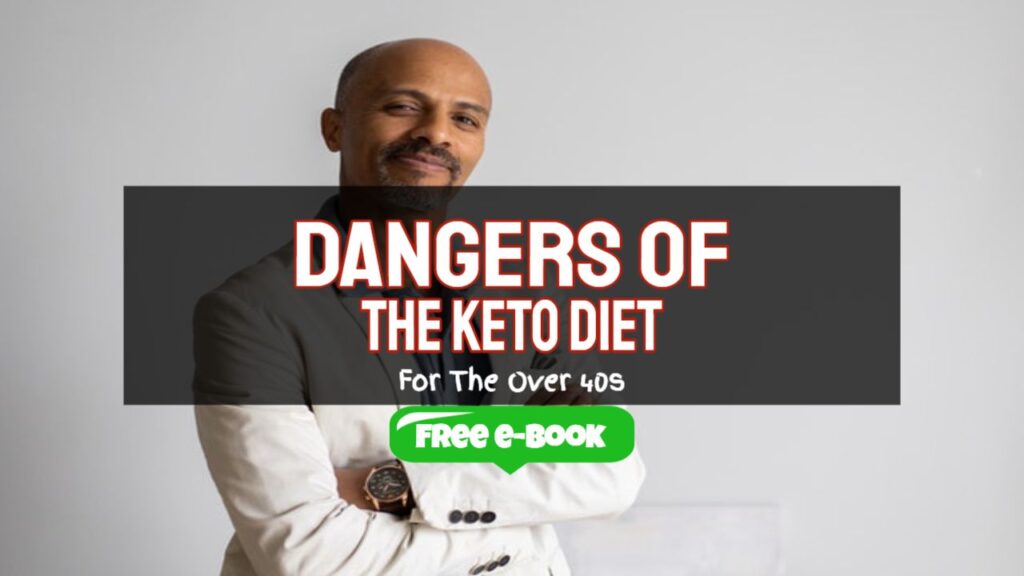Dangers of the Keto Diet
While the ketogenic (keto) diet has been around for decades, it does come with certain hazards. One of them is that the keto diet is surrounded by a great deal of misinformation.
While there are several benefits to living a ketogenic lifestyle, there are also certain risks to consider before embarking on a ketogenic diet. It’s critical to have realistic expectations before embarking on any new endeavor, especially something as severe as drastically altering your daily diet.
The keto diet is a very low carbohydrate diet that can help you lose weight quickly—but it also has certain side effects that you may not like.
A normal keto diet consists primarily of fat, with some protein and very few carbs. Carbohydrates provide the body with the majority of the energy it requires in the form of glucose. With such a low carbohydrate and glucose intake, the body begins to utilise glucose stored in the liver and muscles as glycogen. This is the body’s initial source of energy. When glycogen levels are depleted, the body switches to fat storage for energy, which is why the keto diet is so popular for weight reduction.
This is referred to as ketosis, which is the metabolic process through which ketones are converted to energy. While ketosis is normal and incredibly efficient at burning fat fast, there are several ways for the keto diet to go awry.
Susceptibility to illness and disease
One of the initial disadvantages of the keto diet is that a high proportion of beneficial carbs such as fruits and vegetables are prohibited. This eliminates a significant portion of your regular vitamin, mineral, and fiber consumption. Vitamins and minerals are required for every single bodily function. If you do not consume fruits and vegetables, your immunity will be weakened and you will become unwell more frequently. You will then battle the sickness. Consuming a variety of fruits and vegetables also helps avoid heart disease, cancer, diabetes, and hypertension. As a result, it is prudent to consider overall health, not only weight loss (1). Vegetables grown above ground are acceptable on a ketogenic diet. Broccoli, kale, spinach, asparagus, sprouts, and cauliflower are all examples.
Constipation
You are also deficient in fiber if you do not consume fruits and vegetables. Meat and dairy items contain no fiber. Fibre is required to maintain healthy gut bacteria, which is associated with both mental and physical wellness. Additionally, it keeps your digestion working and prevents constipation. Constipation is inconvenient at best and severely painful at worst. Constipation can be alleviated by drinking plenty of fluids or by using medicines. However, the most effective method is to consume fiber fruits, and vegetables. (2)
Ketogenic diets are high in dairy goods like cheese and cream, as well as meats like bacon and sausages, poultry, and game. The problem is that high-fat meals are frequently rich in saturated fat and cholesterol when consumed on a regular basis on the keto diet. In the long run, this might result in fatal illnesses such as cancer and heart disease as a result of blocked arteries (3). Is it really worth it to kill yourself in order to be thin? It is critical not to adhere to a rigorous keto diet for an extended period of time and to monitor your blood fat levels.
If finances permit, purchase meat from grass-fed, organically bred animals. This meat is of superior quality and includes omega 3 fatty acids, which are beneficial to our health. Antibiotics and hormones are present in meat from animals kept inside and fed grain rather than grass. These are fed to the animals and end up in the meat and milk. These thus have the potential to have a detrimental influence on human health (4). Keep processed meats such as sausages, bacon, corned beef, chicken nuggets, and cold cuts to a minimum. These are salty and include preservatives. Additionally, they have been related to the development of health problems such as cancer. (5)
Keto Flu
Keto flu is a regular side effect of this method of diet. The most often reported symptoms to resemble those of the flu – headache, exhaustion, and nausea. Additionally, muscular weakness, achiness, and cramping; fear, anxiety, sadness, acne, diarrhoea, constipation, and an overall sensation of exhaustion are common symptoms. The reason for suffering keto flu is that the body is transitioning from glucose to ketones as an energy source. Symptoms are caused by the adaptation process (6).
Those who advocate for the keto diet advise that if you suffer these symptoms, you should drink plenty of water and relax until they subside. This is accurate, however, transitioning to ketones after years of consuming glucose might take many weeks (7).
Dehydration
As previously stated, the keto diet relies on ketones for energy. While extra glucose may be stored on a typical diet, excess ketones cannot. They must be eliminated by the body, which is why they are expelled in the urine. As a result, you’ll need to pee considerably more frequently on a keto diet, which can result in a deficiency of water in the body, referred to as dehydration. Dehydration manifests as fatigue, headaches, and irritability. Because thirst is a solid symptom of dehydration, it is better to listen to your body and drink lots of water (8).
Kidney Stones
An unpleasant side effect of the keto diet is kidney stones, however, you may believe it is worth the risk given that they impact around 8% of individuals and grow with age (9). If left untreated, kidney stones can cause irreparable renal damage (10).
Diarrhoea
Constipation is the inverse of diarrhoea, which can also be a side effect of the keto diet. The ketogenic diet is extremely rich in fat. When we consume fat, the liver creates bile to aid in the breakdown of that fat. Bile has little impact on a regular diet; nevertheless, eating too many fats results in an excess of bile. This may result in diarrhoea, as bile is a laxative (11).
When you have diarrhoea, the food is not fully broken down because it passes too quickly through the intestines. Along with being inconvenient, it may be somewhat humiliating. If food moves too quickly through the digestive tract, the nutrients consumed are not absorbed into the body. This should not be a problem in the short term, but in the long run, it can result in dehydration and other health problems (12).
Bad Breath
Halitosis is another unpleasant side effect of the keto diet. As such, it poses little risk, but be advised – you may lose friends! The good news is that this phase only lasts a few weeks as your body learns to burn fat rather than carbs. The best method to combat it is to drink enough water and maintain proper dental hygiene (13).
Weight Gain
Many people who adhere to keto diets do so in order to lose weight. However, obesity is one of the negative consequences of this sort of diet. Obesity is harmful because it is associated with a variety of chronic health problems, including heart disease and cancer. The reason for this is that when we consume a high amount of saturated fats, our livers become overworked and begin converting any more calories to fat rather than utilising other available energy sources. Because fat contains more calories per gram than carbs, it is critical, as with any diet, not to consume too many calories (14).
Diabetes
A high-fat diet results in something called insulin resistance. This occurs when cells become oblivious to the presence of insulin in the circulation. When we eat, insulin is produced to allow the cells to absorb the glucose required for energy. Excess fat obstructs this process, resulting in insulin resistance, which can progress to diabetes (15). Diabetes has long-term repercussions that include eye difficulties that can result in blindness and nerve damage that can result in limb amputation (16).
Poor Mental Health
Finally, a high-fat diet poses a major risk of increased stress, anxiety, and depression. Fat is inflammatory, and its long-term influence on the brain results in many devastating mental health conditions. Not to mention that the diet is quite restrictive, which can result in poor mood merely from eating the same items over and over (17).
When considering starting the keto diet, it is critical to get medical counsel, especially if you have any health concerns. At the very least, eat this way for a brief period of time. There are other additional methods for losing weight that is, arguably, considerably less dangerous.
References
- Fruit and Vegetable Intake and Risk of Major Chronic Disease https://academic.oup.com/jnci/article/96/21/1577/2521033?login=true
- Constipation on Ketogenic Diet: Causes and Remedies https://www.ketovale.com/constipation-on-keto/
- Fats, Cholesterol, And Chronic Diseases https://www.ncbi.nlm.nih.gov/books/NBK235018/
- Antibiotic exposure and risk of weight gain and obesity: protocol for a systematic review https://www.ncbi.nlm.nih.gov/pmc/articles/PMC5571496/
- Healthy Eating: The Dangers of Processed Meat https://www.onhealth.com/content/1/processed_meat_dangers_healthy_eating
- Consumer Reports of “Keto Flu” Associated with the Ketogenic Diet https://www.frontiersin.org/articles/10.3389/fnut.2020.00020/full?
- The impact of keto-adaptation on exercise performance and the role of metabolic-regulating cytokines https://academic.oup.com/ajcn/article/110/3/562/5539226
- Clinical Aspects of the Ketogenic Diet https://onlinelibrary.wiley.com/doi/full/10.1111/j.1528-1167.2007.00914.x
- Incidence and Characteristics of Kidney Stones in Patients on Ketogenic Diet: A Systematic Review and Meta-Analysis https://pubmed.ncbi.nlm.nih.gov/34070285/
- Kidney stones https://www.nhs.uk/conditions/kidney-stones/
- Researchers find new treatment for constipation https://www.sciencedaily.com/releases/2011/05/110510101500.htm
- Effect of high fat-diet and obesity on gastrointestinal motility https://www.ncbi.nlm.nih.gov/pmc/articles/PMC3890396/
- 5 easy tricks to stop keto bad breath https://dentalhealth.oxyfresh.com/dental-health/5-easy-tricks-to-stop-keto-diet-bad-breath/
- Reasons for not losing weight on a keto diet https://www.medicalnewstoday.com/articles/326484
- Deleterious effects of lard-enriched diet on tissues fatty acids composition and hypothalamic insulin actions https://pubmed.ncbi.nlm.nih.gov/26525379/
- Complications of diabetes https://www.diabetes.org.uk/guide-to-diabetes/complications
- Diet-Derived Fatty Acids, Brain Inflammation, and Mental Health https://www.ncbi.nlm.nih.gov/pmc/articles/PMC6448040/








Your insights on the keto diet’s potential pitfalls are really significant, especially given the overwhelming amount of misinformation out there. Having tried various dietary approaches myself, I can definitely relate to the confusion that comes with a radical shift in one’s eating habits.
I can completely relate to that sense of confusion when diving into new dietary approaches. The keto diet, in particular, seems to polarize people, often leaving them wondering what’s truly beneficial versus what’s just noise. I’ve dabbled in various diets myself and found that while some can be effective, the radical shifts can sometimes feel more overwhelming than liberating.
I get what you mean about navigating dietary choices; it’s just as tricky when it comes to finding a non-toxic mattress, where the details can really make a difference in your wellness journey.
‘6 Things to Avoid when Choosing a Non-Toxic Mattress’
https://stop-global-warming.co.uk/6-things-to-avoid-when-choosing-a-non-toxic-mattress/.
It’s interesting how many parallels there are between dietary choices and other aspects of wellness, like selecting a non-toxic mattress. The confusion surrounding the keto diet really mirrors the overwhelming options we face with so many new health trends. It’s like each diet has its own community, passionately advocating for its benefits while often dismissing other approaches as unfounded. It can leave you feeling lost in a sea of information that sometimes feels more like marketing than genuine health advice.
I know what you mean about feeling lost in the sea of choices; I recently came across a piece that outlines key pitfalls to avoid when selecting a non-toxic mattress, and it really helped clarify some important aspects for me.
‘6 Things to Avoid when Choosing a Non-Toxic Mattress’
https://stop-global-warming.co.uk/6-things-to-avoid-when-choosing-a-non-toxic-mattress/.
You’ve touched on an important point that many of us can relate to: the abundance of choices in both diet and wellness can feel overwhelming. It’s fascinating how passionately people advocate for their preferred diets, often creating tight-knit communities around them. This is especially true with something like the keto diet, where there’s a lot of strong opinions and a sense of belonging for those who choose that path.
It’s interesting how shifting to something like the keto diet can really challenge our relationship with food. I’ve found that any dramatic dietary changes often come with their own set of hurdles, not just physically but mentally, too. It can feel overwhelming when you’re bombarded with so many conflicting sources of information.
It’s interesting to hear about your experiences with various diets—many people go through a similar journey before finding what works for them. The keto diet can feel particularly polarizing, especially with so much conflicting information out there.
It really is intriguing how personal each diet journey can be. For me, the keto diet’s polarizing nature came to light when I started hearing so many different stories—some people swearing by it and others having a tough time. What’s struck me is how much our individual biology plays into our responses to different diets. I think it speaks to a broader theme in health and wellness today, where there’s an increasing focus on personalized nutrition rather than a one-size-fits-all approach.
I completely resonate with what you’re saying about the personal nature of diet journeys. It’s fascinating how two people can follow the same diet—like keto—and have such differing experiences. I’ve had friends who thrived on it, describing newfound energy levels and incredible weight loss, while others have struggled with it, often feeling deprived or experiencing some unpleasant side effects.
You make such a great point about the personal nature of diet journeys. It’s interesting to think about how much individual biology and lifestyle choices play a role in our experiences with diets like keto. I’ve had a few friends who have had incredible success with it too, touting their increased focus and energy, which is always compelling to hear.
I can relate to that—just as diet journeys are uniquely personal, choosing a non-toxic mattress can be a bit of a maze, and there are definitely some pitfalls to watch out for.
‘6 Things to Avoid when Choosing a Non-Toxic Mattress’
https://stop-global-warming.co.uk/6-things-to-avoid-when-choosing-a-non-toxic-mattress/.
It’s really fascinating how varied our experiences with diets can be, isn’t it? The keto diet definitely illustrates this well. I’ve had friends who reported significant changes in mood and energy levels, while others really struggled with the transition. It makes you wonder about the role of genetics and metabolism in how our bodies process food.
You’ve tapped into such an important aspect of diet and wellness. It’s fascinating to witness how personal experiences shape our understanding of diets like keto. Those contrasting stories you mention highlight the complexity of nutrition. Our bodies truly do operate like individual ecosystems, reacting to foods based on genetics, lifestyle, and even mental state.
It’s great to hear you’ve navigated through various dietary approaches yourself. The confusion that comes with making significant changes to our eating habits is something many people experience. With the keto diet, the science can sometimes get lost in the noise of trends and personal testimonials.
You really hit the nail on the head with the confusion around dietary changes. It can feel overwhelming to sift through all the noise, especially when every diet seems to have its die-hard supporters and detractors. I’ve definitely found that relying on science-backed information is essential, but personal experiences often complicate things.
I hear you on that front. The noise around diets can be really disorienting. It’s interesting how personal experiences can sometimes outweigh the science, even when we know what’s backed by research. Everyone’s body is unique, so what works wonders for one person might not do anything for another.
Your insights on the keto diet really resonate with me, especially the need for realistic expectations. I was intrigued by how quickly people can lose weight on keto, but my own experience with different diets has shown me that sustainability is often more important than rapid results.